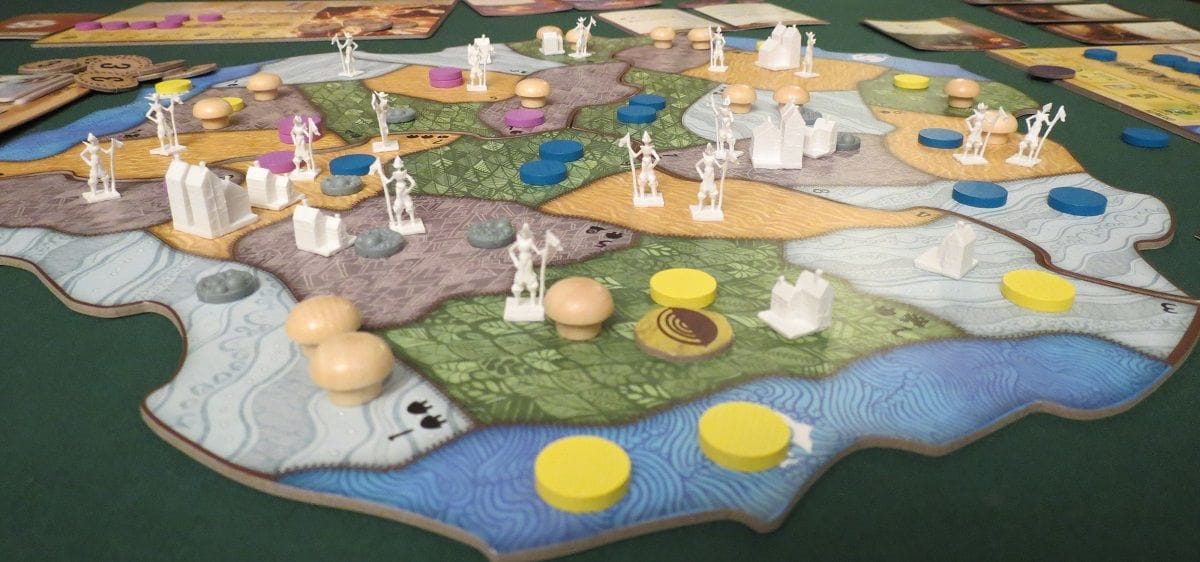Spirit Island
In Tokyo, when 2022 would shortly become 2023, we wanted to play a game. My brother pulled his copy of Spirit Island off the shelf. It’s a cooperative board game with a rich set of fast-and-slow-moving mechanics and a semi-predictable kind of adversarial evolution.
Getting that game rolling was difficult for me and probably more so for my brother.
He explained the basic idea; I thought it sounded great. He wanted to play a straightforward beginners’ game so I could get a handle on the rules and the flow of the game. I wanted to use the most advanced island spirit so I could unleash the most complicated and devastating powers of destruction on those ravaging invaders.

Given the prior knowledge mismatch — familiarity with the game board, awareness of recurring activity patterns, and understanding of gameplay mechanics — there was little chance our first attempt would be an ideal game for either of us. It was fun, but we didn’t make it to the end before it was time to welcome in 2023.
Later that year, he told me about a game called Horizons of Spirit Island he had learned about. It's essentially “Spirit Island for Dummies,” a sandboxed and quicker-to-play version. People like me can get started without being distracted by the complex range of possibilities before understanding the basics of how the gameplay works.
I’ve played it, enjoy it, and I’m starting to “see the board:” tradeoffs, timings, cycles, components, and core gameplay activities. For now, it’s still fresh enough that I can look back at that first game and think, I had no idea what I was doing back then, and also that my brother has remarkable patience.
Learning a New Game
It’s quite difficult to remember, once we understand something, how long it took to learn, what that learning was like, and what we understood and believed before we knew that new thing.
This is just as true in board games as in physical endeavors, craft work, technical work, practical skills, and organizational endeavors. It’s as true for individuals as it is for teams.
As we try to introduce new ways of working, say, Wardley Maps as a communication medium for strategy, or Opportunity-Solution Trees to drive continuous discovery feedback loops, we’re already thinking about the endpoint: it’s sure gonna be great when we’re all playing Spirit Island together!
In our organizations, though, compared to Spirit Island, the levels of scale, the nested patterns of activity, the complexity of the ecosystem, and the breadth of uncertainty we’re attempting to predict and model and work with are orders of magnitude larger. There is no rules manual, and we don't have an 18-minute video to explain how everything works.
Our teams are not just learning to play a new game: we're changing the game beneath their feet while moving from the old to the new. To change the game that our teams are playing, we need to change their understanding of how the game works, if we want them to keep new practices alive.
For those of us who have already played the new game and have built our own understanding of gameplay, it takes foresight, patience, and respect for others' current knowledge to help them learn how to play. Some humility, too: nobody else will come to understand the game exactly as we do, but they will find their way to play more quickly if we help them.
Good Teacher, Bad Teacher
In the first half of the 2010s, I was learning BJJ as a white belt and then a blue in San Francisco. After classes with one instructor, I just seemed to get better. With another, I would leave class knowing that there was even more I didn’t understand, but I didn’t understand it or do any of it better.
It took some time to figure out what was going on. The former would see what I was trying to do and give me a new piece to work on: one more layer to fold into my existing system. The latter would see what I was doing wrong and explain everything to me again: all of the details for the entire process of securing an armbar from mount, for example.
Good teachers see where their students are now, and offer them what they need, to continue learning and exploring. Bad teachers appeal to their own prior knowledge and don't take the student’s existing behaviors into account.
When students, or teams, are learning through action, exploration, and reflection — which they should be — we start by meeting them where they are. (We can always ask the fundamental research question.) We understand their current practices and worldview so we can give them the tools for incorporating new, experimental cycles into their work right now.
By all means, get them excited about Spirit Island! Then, give them Horizons of Spirit Island first.
Resource of Note:
I don’t love linking to LinkedIn, but I do think John Cutler’s latest post of “20 Things I've Learned as a Systems (Over) Thinker” is relevant, thoughtful, and extremely well-considered.
If you’re the kind of person who’s very quick to see that the system (organization) isn’t working in the way you wish, and you’re trying to make it better, there are some things you’ve likely come to understand already, and others that will be new and helpful.
This is Loops and Cycles, a weekly mailing list exploring the processes that produce good products (and organizations). Share it with your team, send it to a friend, or send me your thoughts and questions.


![Teaching People to Play [LC06]](/content/images/size/w100/2024/05/Game_in_progress-_Spirit_Island.jpg)
